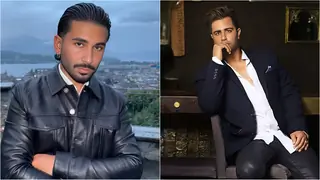RD Burman :A music composer of unparalleled talent!
By: RK Filed Under Bollywood, Music
Posted on June 27, 2007
On 68th birth anniversary of RD Burman
Dada Moni, Ashok Kumar or SD Burman himself made a historical mistake when either of them gave a nickname "Pancham" to RD Burman. RD was master of Saat Sur and he should have been given name "Saptam". There is no second RD Burman. He was a master piece a gem in the field of music.
He was generationless music composer. Audience belonging to any age and era can enjoy his music. On one hand he created the music which could represent the those days generation and on other hand he carried whole generation to the height of music. He defeated everyone in terms of versatility. He was Kishor Kumar in that sense. RD's predecessors took care of purity and many remained devoted to Indian classical music and instruments only. RD did not feel any hitch in using his knowledge of western classical and Jazz.
Gulzar and RD met during the recording of Gulzar's first song " Mera Gora ang lai le" in Bandini and they became life long friend and except Mausam where Madan Mohan gave music, Gulzar remained in company of RD and duo always created magic. We all know that famous anecdote where RD famously had asked Gulzar to bring newspaper so that he can compose music for news headlines published there because Gulzar had asked him to compose music for the song "Mera Kuch Saman tumhare pass parha hai" for his film Ijaazat.
Music was very good and quality was super class in the hands of music maestros like Naushad, Shankar Jaikishan, O.P Naiyar, SD Burman, Anil Biswas, Madan Mohan, C.Ramchandra, Ramlal, Sardar Malik, Ghulam Mohammad, khaiyam, Hemant Kumar, Kalyan Ji Anand ji, Laxmikant Pyarelal, Salil Chaudhary , Vanraj Bhatia etc but youth was not properly represented by their music. Advent of RD made this distinction. He created musical language of youth and he together with Kishor Kumar's youth ful voice paved ground for romantic and energetic songs for Dev Anand, Rajesh Khanna, Randhir Kapoor , AB, Vinod Khanna but he created a wonderful musical aura around Hindi Cinema's most youthful face Rishi Kapoor.
Audience had not listened before a song like "O Hansini" For Rishi Kapoor he created many immortal songs and every song is able to change the mood of a depressive person. They are mood changer, mood lifter. RD got full support in the voice of Kishor Kumar that's why he used to say that there is none like Kishor Kumar as far as versatility is concerned. Though he is not trained singer but KK can sing any song of any type, be it classical, semi classical or a disco song.
If RD was instruments he used in his composition then Kishor Kumar was his voice. RD shined in his capability to know exactly which song should be given to which singer. Often musicians prefer their favourite singers and RD often relied on Kishor Kumar but he knew very well who could sing which song.
How RD's magic left magical impression on people can be understood with the example of Kishor Kumar and Mohd Rafi. Inspite of giving many good songs Kishor Kumar never got lime light and it was all Rafi's show. Except SD Burman most of the old music directors preferred Rafi.
When Burman Dada felt sick during recording of songs of Shakti Samanta's Aradhana. RD got the responsibility and he did not shy to use Kishor Kumar in the film. Film has two songs in the voice of Kishor Kumar and two songs in the voice of Rafi but nation got crazy when Mere sapnon kee rani was released. With this film, super hit phase started for Rajesh Khanna in acting, RD's in musiccomposer and Kishor Kumar's in play back singing.
This sudden explosion of performances of team of RD + KK, created tough phase for Rafi and as hindi cine industry only salutes rising star, film makers avoided a great singer Rafi.
But same RD when got opportunity to compose music for Nasir Hussain's Hum Kisi se kam nahin, then he gave Rafi the song, Kya Hua tera vada, This song resurrected the play back singing life of Rafi.
RD and Gulzar team's stories are so famous and they brought honey to the ears of audience. While Gulzar brought above human words, RD decorated those words in to his wonderfully pleasant music.
RD was married to Asha Bhonsle and their team gave us many beautiful songs including wonderful non filmi album "Dil Parosi hai" but he has left a rich legacy of songs where he has created music for Lata Mangeshkar's voice also.
As he knew very well which song would suit whom so he used suitable singer only.
If during last 15 years more than 80% remix songs have been based on the songs composed by RD, then it suggests his impact on the audience.
Sadly he did not get filmfare award before 1983 when he got for his mediocre work Sanam Teri Kasam. RD came on surface again and again. He had given Shabbir Kumar a good chance in Betaab and Shabbir kumar had got chance to sing for Amitabh Bachchan in Colie and Mard. But came Saagar and whole nation was swinging under the intoxication of "Chehra hai ya chand khila hai" in the voice of Kishor Kumar.
RD's another specificity was to give always wonderful music. No matter which kind of film he has got he created music from his heart and gave his soul to the music. Jeeva is not a film which deserves songs like "Roz Roz ankhon tale" but RD boss created this song with the support of voices of Asha Bhonsle and Amit Kumar.
Many such crap films are there where one can go to see them if has listened music before under the impression that when music is so good then film also should be good. Many shelved films have eaten his wonderful creations.
He did not shy to accept that he took inspiration from ABBA's Mama mia. Whenever he did this he said but with clear understanding that he took one or two note, improvised them and then used in Indian context. He loved Jazz.
He had international appeal. His song In every city was included in New York Parade in Mid 80s.
He was a child when he composed a song and when he visited sets of Fantoosh film he was astonished to find that his father SD Burman had stolen his tune. Song was "Aye meri Topi palat ke aa".
What his songs can create?. It was a gathering of around 100 young people belonging to different nations, different languages. Gathering was happening in a big hall of a hotel and there was a girl who was hosting cultural program for the guests. DJ was there and he was playing songs whichever she was demanding. Then she asked that all people have to give 1-2 songs from their country and DJ will collect those songs within the night and full next day and next evening they will be played. Next evening songs of many countries were collected. People had gathered dancing numbers and they were in full mood to make a dhamal. Songs in different languages were played and people were mad in dance and then suddenly a song from India was played and everybody stopped immediately and once song got rhythm crowd went wild on a song whose words they were unable to understand. It was due to sheer music of the song.
Song was "Dum Maro Dum" from Dev saab's Hare Krishna Hare Ram.
Atleast in that gathering of people of multi ethinicity this song scored parallel with Shakira, Bon Jovi, Madonaa, Michale Jackson, Ricky Martin, Robbie Williams etc's hit dance numbers.
Hindi cine industry should feel shame as they did same with RD what they did with Rafi. Gulzar does not make many films. After some gap he had got 1942- A love story. And its always a fight with songs of this film especially ek ladki ko dekha to.
RD's music provides a height to this song and Kumar Shanu's average singing does not allow to hear it again and again.
Would that Kishor Kumar was alive then this song could have been an immortal song.
RD Burman had a typical face and personality and that's why Mehmood who gave him first break in Chhote Nawab, made him actor also in his film Bhoot Bangla and vow it's a treat to watch RD in that role with his thick glasses on his innocent eyes.
He did not disappoint in any role he took. When he sang he sang it with so much lan that songs and his singing became inseparable.
Be it Mehbuba Mehbuba of Sholay or Humko tumse pyara kaun in zamane ko dikhana hai or many other songs.
There are many known stories about his method of working. His likings and dislikings. He was for music and his life was for music only. And such devotion is not seen easily.
Though we like that RD or some one of his calibre comes in to hindi films but it does not seem possible. But he remains alive through his songs and music of present day's music directors, who very often take inspiration from his old creations.
Its useless to try to mention his good songs as he has a very long list.
We are fortunate that RD created music in our times.


























